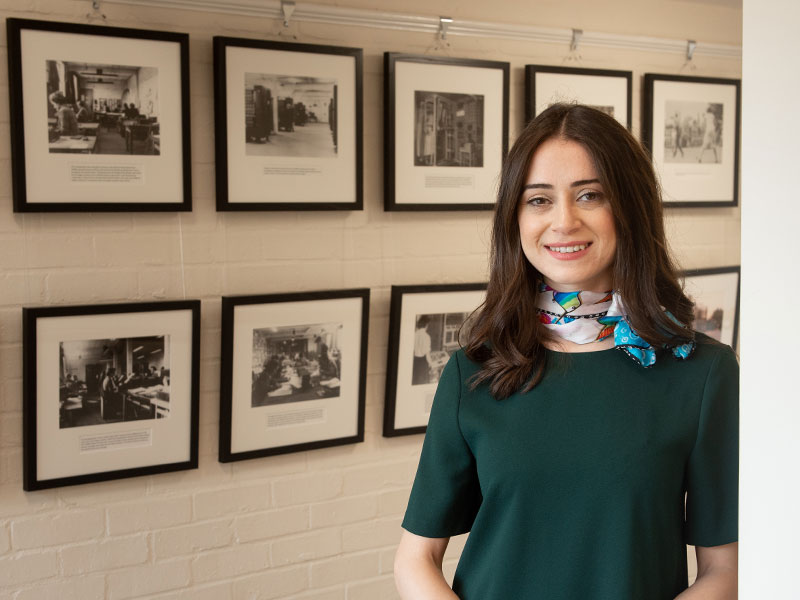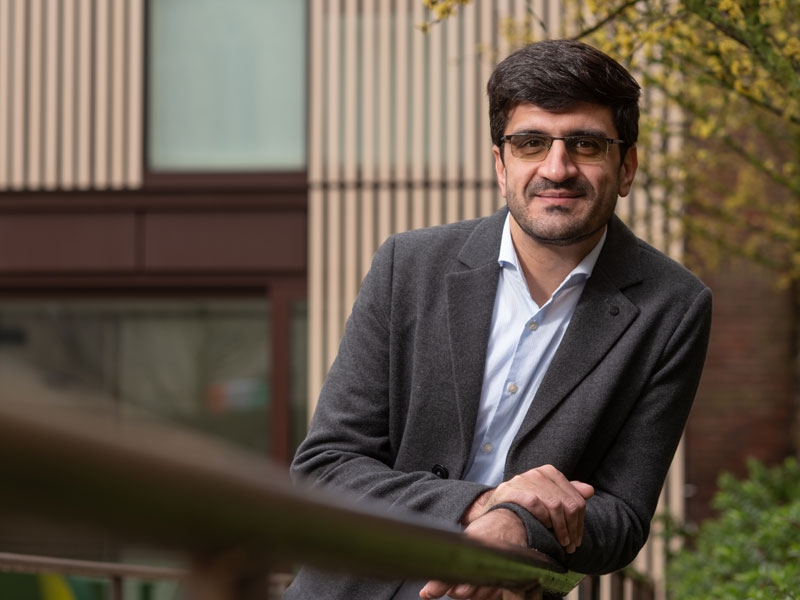Graduate students play a vital role at Oxford, helping to drive forward research whilst inspiring and enriching the experience of others around them. Many go on to make important contributions to the economy and to society, leading the way in their fields and addressing major global challenges.
Providing fully-funded scholarships is key to ensuring that the very best students from around the world are able to pursue further study at Oxford. For this reason, the University has set an ambitious target to create 300 new graduate scholarships over the next five years. Donor support will be essential in achieving this vision.
Zeynep Kaya, Dulverton Scholar
Zeynep was born and raised in Mardin, an ancient city located in the south-east of Turkey. 'I remember when I was first learning English, I saved up to buy an Oxford English Dictionary,' she says. 'Going back home and finding that dictionary reminds me that I always wanted to come here, even if it was a dream that I didn't want to think too much about.'

Although fear of disappointment initially held her back from applying, Zeynep had a change of heart whilst studying for her master's degree. 'I was doing research on cancer,' she explains, 'and the more I learned, the more I realised how little we actually know about it. That's why new discoveries in the field excited me; I felt like a road-map was being generated for an unknown destination. I wanted to devote myself to better understanding the condition, and I decided that Oxford would be the best place for me to do that.'
In 2016, Zeynep became a DPhil candidate in the Medical Sciences Division. Her research focuses on prostate cancer – the most common form of cancer in men in the UK – and the mechanism that regulates its spread to other parts of the body, particularly the bone.
'Cancer is not a static disease, and so finding something that will cure all patients is really difficult,' she says. 'It's a bit like uncovering a mystery. You can't work out all of the unknowns by yourself, but if everyone puts in something from their own research, that will help to solve the puzzle.'
For Zeynep, studying at Oxford has been a life-changing experience. But without the financial support provided by a scholarship, she would have been forced to turn the opportunity down. 'I remember finding out that I had been awarded a scholarship from the Dulverton Trust,' she says. 'I can still feel the happiness of that moment. It truly was the greatest gift.'
Pashtoon Atif, Weidenfeld-Hoffmann Scholar
A graduate scholarship also opened the door to further study for Pashtoon. 'Coming from Afghanistan, I would never have made enough money to afford a course like this,' he says, referring to the Master of Public Policy (MPP) on which he is currently enrolled. 'Without the Weidenfeld-Hoffmann Trust I would not have been able to come.'

Before applying to Oxford, Pashtoon had spent a number of years engaged in relief and human development activities in Afghanistan and Sudan. His most recent appointment was at GoodWeave International, a non-profit organisation that seeks to end child labour in the carpet industry. But although it was work he loved, Pashtoon felt the time had come to try something new. 'I thought that the MPP would be a great course to prepare me for a transition into the public sector,' he explains.
Taught at the Blavatnik School of Government, the MPP is an intensive, one-year taught course for existing and aspiring leaders with a commitment to public service. It equips students with the knowledge and skills they need to address some of this century's most complex public policy challenges. For Pashtoon, it is the connection between public policy and economics that holds particular interest. 'Afghanistan is dependent on foreign aid and I believe that’s down to our poor economic policies,' he says. 'There are some economic theories that I want to explore more, and consider how I might be able to apply them to my own country.'
As a Weidenfeld-Hoffmann Scholar, Pashtoon benefits from involvement in the trust's Leadership Programme, which provides scholars with the skills, knowledge and networks they need in order to make valuable contributions to public life. The programme includes practical skills training, as well as mentoring and networking events. 'I went through five days of moral philosophy seminars when I arrived,' he recalls. 'I got to meet the other scholars; we studied and ate together, so we made friends from the very beginning. It was a great introduction to life at Oxford.'
Pashtoon will soon return to Afghanistan, where he will conclude his studies with a work-placement at the Ministry of Rural Rehabilitation and Development. But although his time at Oxford has been relatively brief, it has left an indelible mark. 'It has surpassed my expectations,' he says. 'The city is beautiful, the University is great, the workload is intense, but good. I'm learning a lot and I’m very glad to be here.'
Zeynep Kaya is supported by the Dulverton Trust and Cancer Research UK. Pashtoon Atif is supported by the Weidenfeld-Hoffmann Trust, the Annenberg Foundation and the Blavatnik School of Government.